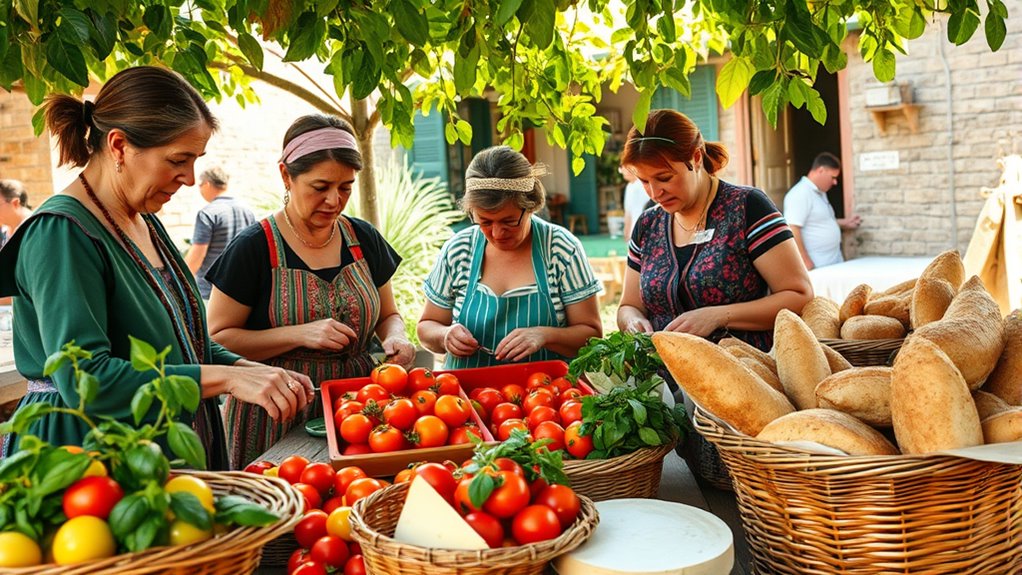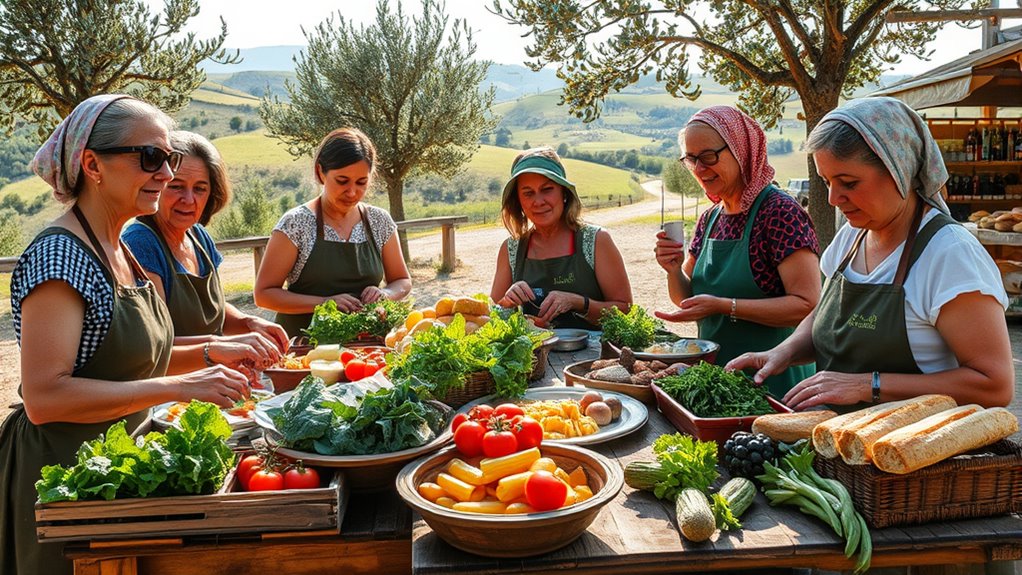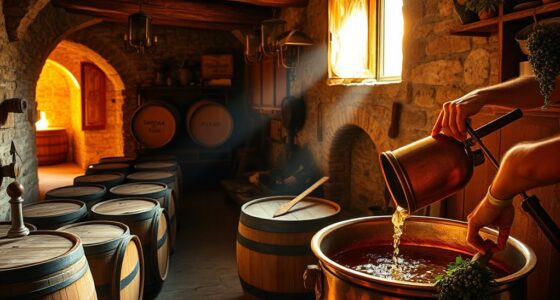Women in Italy’s Slow Food movement play a vital role in preserving culinary traditions and advocating for sustainable practices. They actively safeguard regional recipes, pass down food stories, and lead community initiatives that promote local products and biodiversity. Their efforts challenge gender disparities and inspire future generations to value Italy’s rich gastronomic heritage. By supporting women’s leadership, the movement stays vibrant and inclusive. To discover how their work shapes Italy’s culinary future, explore further.
Key Takeaways
- Women preserve Italy’s culinary heritage by passing down traditional recipes and techniques across generations.
- They lead initiatives advocating for gender equality within the food system and artisanal sectors.
- Women promote sustainable practices, supporting local producers and traditional methods aligned with Slow Food principles.
- Their community leadership fosters pride, educational efforts, and the preservation of regional food identities.
- Women shape Italy’s gastronomic future by empowering communities and ensuring the authenticity of culinary traditions.

Women have played a pivotal yet often overlooked role in Italy’s Slow Food movement, shaping its growth and values from the ground up. Their influence is rooted in a deep connection to Italy’s culinary heritage, which they have preserved and promoted through their active participation. As guardians of traditional recipes and local food knowledge, women have helped maintain regional identities that might otherwise have faded in the face of globalization. By passing down cooking techniques and food stories from generation to generation, they guarantee that Italy’s rich culinary traditions remain vibrant and authentic.
In the Slow Food movement, women’s contributions go beyond preservation; they advocate for gender equality within the food system. Historically, women have been the primary custodians of food preparation at home, yet their role in the wider food industry was often undervalued or marginalized. Today, many women are leading initiatives that challenge these disparities, pushing for recognition and equal participation in food policy, farming, and artisanal production. Their efforts aim to create a more inclusive environment where women’s voices are heard and their expertise respected. This shift not only empowers women but also enriches the movement by broadening perspectives and encouraging diverse leadership.
You’ll notice that women involved in the Slow Food movement often focus on sustainable practices that honor Italy’s culinary heritage. They champion small-scale farmers, local producers, and traditional methods that prioritize quality over quantity. Their activism emphasizes the importance of protecting biodiversity and cultural diversity within food systems—values that align perfectly with Slow Food’s mission. By doing so, they help forge a stronger, more resilient food culture that celebrates Italy’s regional flavors and culinary history, guaranteeing these are not lost to mass production or commercial interests. Additionally, their engagement is supported by psychological research that highlights the positive impact of community-led initiatives on social cohesion and cultural preservation.
Furthermore, women’s leadership in community kitchens, food cooperatives, and educational programs creates a ripple effect that inspires others to embrace Slow Food principles. Their work fosters a sense of pride and ownership in local food traditions, encouraging younger generations to appreciate and sustain their culinary heritage. As advocates for gender equality, they challenge stereotypes and promote a more equitable food landscape, where women’s contributions are recognized as essential. Their dedication helps forge a future where Italy’s gastronomic legacy continues to thrive, rooted in the empowerment and active participation of women. In this way, women are not just preserving Italy’s culinary heritage—they are actively shaping its future.
Frequently Asked Questions
How Do Women Influence Sustainable Farming Practices in Italy?
Women influence sustainable farming practices in Italy by championing urban agriculture, which promotes local, eco-friendly food production. They also drive culinary innovation, blending traditional techniques with modern sustainability ideas. Through these efforts, women help preserve Italy’s culinary heritage while fostering environmentally responsible farming. Their active participation enhances community engagement and promotes eco-conscious practices, ultimately shaping a more sustainable food system across Italy.
What Challenges Do Women Face Within the Slow Food Movement?
You face challenges like gender stereotypes, which cast women as secondary in the movement, making it harder to be recognized. Balancing work and family feels like walking a tightrope, with societal expectations pulling you in different directions. These obstacles can dim your voice at gatherings and hinder your leadership. Despite this, your passion for sustainable food keeps you pushing, breaking barriers and reshaping Italy’s slow food future.
Are There Specific Programs Supporting Women Entrepreneurs in Italy’S Food Sector?
You’ll find that Italy offers specific programs supporting women entrepreneurs in the food sector, including initiatives like women-led startups and culinary mentorship programs. These programs aim to empower women by providing resources, networking opportunities, and skills development. By participating, you can access mentorship, funding, and community support, helping you grow your food business and contribute to Italy’s rich culinary tradition.
How Do Women Contribute to Preserving Regional Italian Food Traditions?
You contribute to preserving Italy’s regional culinary traditions by actively maintaining cultural heritage through traditional recipes and techniques. Your efforts support culinary innovation, blending old methods with new ideas to keep traditions alive and relevant. By sharing stories behind dishes and promoting local ingredients, you help safeguard Italy’s rich food culture for future generations, ensuring that regional specialties thrive amidst modern influences.
What Role Do Women Play in Food Education and Community Outreach?
Women hold the incredible power of transforming communities through food education and outreach, shaping future generations with passion and dedication. You can see women empowering others by sharing culinary mentorship, inspiring confidence and preserving traditions. Their influence is unstoppable, creating a ripple effect that sustains regional flavors and values. By actively participating, you contribute to women empowerment and guarantee that Italy’s rich culinary heritage continues to thrive for generations.
Conclusion
So, here you are, thinking women’s roles are just behind the scenes, right? Well, surprise! In Italy’s Slow Food Movement, women are actually steering the ship—preserving traditions, pushing for sustainability, and challenging norms. Funny how their quiet influence shapes the future of food while the world watches. Maybe, just maybe, the real slow revolution is led by women quietly redefining what good food truly means. Who knew change could be so deliciously understated?









